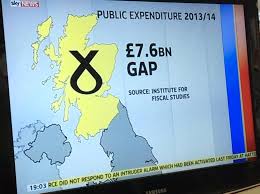SO WHAT DOES FISCAL AUTONOMY MEAN, EXACTLY?

GEORGE KEREVAN
Is this a Black Hole I see before me?
In Scotland for the past week, the General Election campaign has been about fiscal black holes and who is digging themselves into one. Jim Murphy proclaimed there was no need for further spending cuts in Scotland, only to be slapped down by Ed Balls, whose commitment to eliminating the £90bn annual budget deficit is paramount.
However, the big debate north of the border concerns an alleged £7.6bn gap in Scottish public finances that would emerge if Holyrood was granted Full Fiscal Autonomy (FFA). That is the power to set or collect all taxes paid in Scotland, while remaining part of the Union.
That leaves open the issue of how Scotland pays into the UK Exchequer for common services, a point I will return to.
According to a recent paper from the Institute of Fiscal Studies, a Scottish Government operating with FFA would need to find (or cut) £7.6bn from public spending in 2015-16, compared to the projected situation under present rules.
Hint: does this call into question FFA as a political goal?
To be absolutely clear - this £7.6bn is not the Scotland Government’s forecast deficit. That will be circa £14.2bn, assuming Scotland has its pro rata share of (sinking) oil revenues. That would be a substantial proportion of the overall 2015-16 UK forecast deficit of £72.9bn.
So where does the £7.6bn come from? It is made up of two numbers. First an estimate of the how much the Scottish Government spends in excess of the UK average, as a percentage of GDP (reset for 2015-16). IFS reckons this is £3.9bn. OK, we all know Scotland has higher spending per citizen, for historical, geographical and health reasons.
The second bit is the projected loss of tax revenues to come from falling North Sea oil prices and production. IFS puts that at £3.6bn. With a little technical rounding, we get the £7.6bn. But what the hell does it mean?
First, IFS is clearly assuming that the Treasury will still be running an overall UK deficit, which it puts (optimistically) at 4 per cent of GDP. That is the funding available, collectively, to cover the notional deficits run by all UK constituent nations and regions. Scotland would be party to its share.
However, IFS is making the political assumption that any Scottish Government spending per capita - above and beyond the UK average – will have to be fully funded from Scottish resources. That’s the £3.9bn bit of the £7.6bn mentioned above. Plus, Scotland will have to pick up the tab somehow for the projected fall in its oil revenues, the £3.6bn bit. Hey presto and FFA will need Scotland to find circa £7.6bn in new taxes, if it wants to maintain is present welfare provision. Or make budget cuts.
Or just forget about FFA altogether.
If you follow this line of reasoning, you end up with the notion that Scotland should keep the present funding arrangement, with the rest of the UK (or foreign buyers of Treasury gilts) subsidising our lifestyle. How moral is that?
Worse, perhaps, opting for the fiscal status quo deprives Holyrood of political accountability as well as the policy tools to grown the domestic economy.
But you don’t have to follow the IFS reasoning. For starters, it is common ground in all federal or semi-federal set-ups for richer regions to cross-subsidise poorer or under-performing ones, even over considerable periods of time. That is true in Spain, Germany, Canada and the United States. The IFS assumption seems to negate this obvious truth.
Of course, there is lots of room to argue about how much cross-subsidy there should be. Equally, Scotland (with oil) has been a net contributor to UK finances in most periods since 1976, not a supplicant – even if it also ran a higher per capita public spend. That was also the case before the advent of North Sea oil, when our manufacturing industries contributed significantly in corporation tax to the Treasury.
One obvious gap in the present discussion is that in offering Scotland Home Rule (and de facto FFA) just before the referendum vote, none of the three main Unionist parties bothered to examine what UK fiscal compensating mechanism would accompany such a dramatic constitutional change.
That, of course, would necessitate some system of political bargaining between the nations and regions of the UK. Instead, the possibility of the SNP returning the largest bloc of MPs from Scotland has provoked virtual hysteria in the Westminster Establishment.
I remain of the view that FFA is key, not just to making Scotland’s politicians fully accountable to Scottish voters (who pay the taxes). It is also cardinal to readjusting the economy away from consumption to productive investment.
Could it be that there are some politicians who prefer Scotland to remain a fiscal dependency of the UK, so they can seek votes by offering goodies to their preferred clientele?
George Kerevan is the SNP Candidate for the East Lothian Constituency in the Westminster Election.





